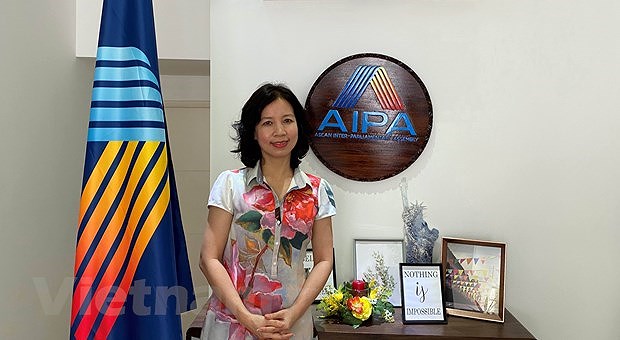 Nguyen Tuong Van, Secretary-General of the ASEAN Inter-Parliamentary Assembly (AIPA) (Photo: VNA)
Nguyen Tuong Van, Secretary-General of the ASEAN Inter-Parliamentary Assembly (AIPA) (Photo: VNA)
Hanoi (VNA) – On the occasion of the 25th anniversary of Vietnam-US diplomatic ties, Nguyen Tuong
Van, Secretary-General of the ASEAN Inter-Parliamentary Assembly (AIPA),
has penned an article on the role of parliamentarians in the 25-year diplomatic
relationship between the two countries.
In the article, Van, who was former deputy director of the external relations department in
the Vietnam National Assembly’s Office with nearly 20 years in charge of Vietnam-US relations, recalled the day a quarter of a century ago when US President Bill Clinton officially announced the normalisation of
US-Vietnam relations.
She stressed that no one
could have imagined that the two countries that were once mortal enemies were
closing their traumatic past and moving on to a new chapter in their
history.
“In order to take historic steps
in Vietnam-US relations, from a former
enemy to a friend and a comprehensive partner since 2013, many changes have
occurred in the way of thinking and ideology of the heads of parliament and
government on both sides,” Van
noted.
According to her, what Vietnam and the US have done is the result of a
long process with persistent efforts by both sides to overcome major obstacles.
Van wrote, “It is
important to mention the contributions of American lawmakers who have tried
their best for the development and interests of the two nations. Prominent
among them were the late Senator John McCain and the former Senator, US
Secretary of State John Kerry, who led the way in breaking the iceberg of
suspicion among American politicians. Looking back at the whole process, there
is a paradox in Vietnam-US
relations, that is, those who fought in the past became the pioneers in healing
the relationship. Without the strong support of Senators McCain and Kerry, the
normalisation process would have been delayed for many years since opposition
in the US Congress was still very strong.”
She
said in the final years of his life, Senator McCain suffered from brain cancer, but he continued to fight for peace, stability
and law and order in Asia-Pacific, especially the actions of China in the
militarisation of the South China Sea (called East Sea in Vietnam).
Also
a veteran of the US, joining the naval force in the war, Senator - former
Secretary of State, John Kerry is often regarded as one of a pair of cards
along with Senator McCain in the issue of healing wounds between the two
nations although the two senators belonged to opposing parties.
Senator Kerry was the Chairman
of the Special Committee on Prisoner of War and Missing in Actions Affairs
(POW/MIA). At that time, the Vietnam War
was still a very sensitive issue, a painful wound for Americans. But, with
dozens of trips to Vietnam and
Southeast Asia, and by studying thousands of documents and images, Kerry
clarified the rumours of US soldiers imprisoned in “secret prisons" in Vietnam. That helped him gain a high reputation
in the US Congress.
Van
also mentioned Senator Patrick Leahy, Vice Chairman of the US Senate
Appropriations Committee, who has
devoted 30 years to war recovery efforts between the two countries. Senator
Leahy is considered the next generation of McCain and Kerry in cultivating
Vietnam-US relations. Senator Leahy,
79 years old, has a special affection for Vietnam and has made great contributions to
budget allocations for Vietnam not
only in dealing with the aftermath of the war but in many fields.
As trust between the two
countries improved, Senator Leahy started projects to help Vietnam, in which
the Leahy War Victims Fund provided prosthetics and wheelchairs to help
thousands of Vietnamese people.
Senator
Leahy was also a campaigner for the repatriation of the remains of American
soldiers missing in the war. He once said the work helped ease the pain of
hundreds of American families, and he could only do so with the help of the
Vietnamese Government, even when Vietnam was facing poverty and hunger
after the war and the US economic embargo.
Van
underlined that 25 years is not a long time in the history of relations between
the two countries, but what Vietnam and the US have achieved, with the
contributions of the US Congress, US Congressmen and the National Assembly of
Vietnam, is really impressive. It significantly contributed to paving the way
for the outstanding co-operation of the two countries in all fields at present.
“Besides
bilateral interests, the two countries are closer to each other because they
share strategic interests in maintaining peace, security, stability, cooperation
and order based on laws in Asia-Pacific, including issues in the East Sea,
Mekong, Korean Peninsula and coordination in regional and international forums.
Most importantly, the relationship between the two countries was established on
the basis of the principles of respect for independence, sovereignty,
territorial integrity and political institutions,” Van wrote in the article.
She
highlighted that the strategic trust between the people and the leaders of
the two countries has been increasingly improved, and expressed her belief that,
in the future, the two sides will continue to dismiss differences, respect
history and look forward, for a shared future of trust, peace and prosperity./.